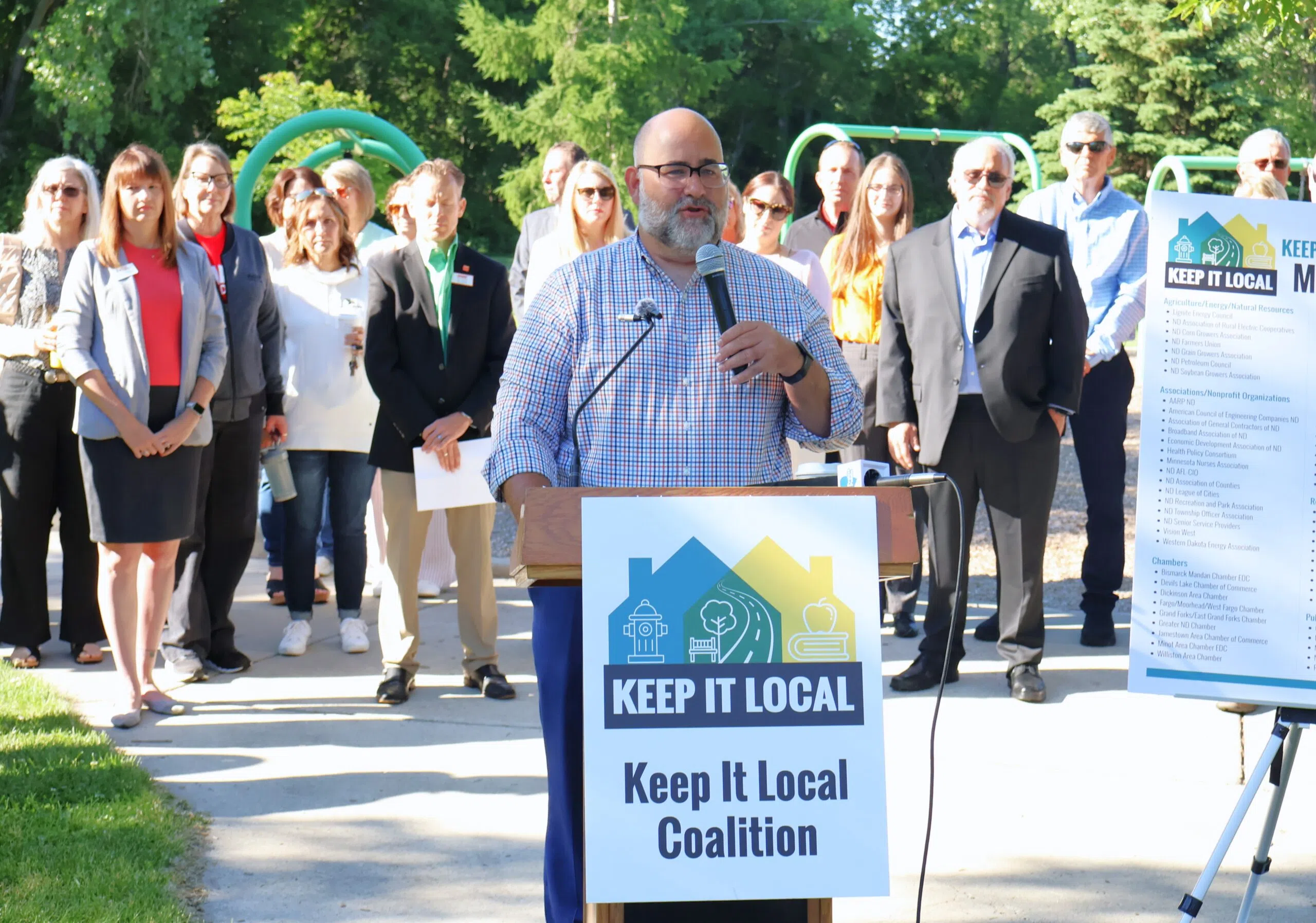
Chad Oban, chair of Keep It Local, a coalition of organizations opposing a ballot initiative that would eliminate property taxes in North Dakota, delivers remarks at Jaycee Centennial Park in Bismarck on June 20, 2024. (Michael Achterling/North Dakota Monitor)
BY: MICHAEL ACHTERLING
BISMARCK, N.D. (North Dakota Monitor) – More than 60 North Dakota groups have formed a coalition opposing a ballot initiative that would eliminate property taxes based on assessed value.
On Thursday, members of Keep It Local held news conferences in Bismarck and Fargo to voice their opposition to the proposed property tax measure and describe how funding local governments would change if it passes.
“North Dakotans understand we cannot fund our emergency services, like fire and police, and schools and libraries on hopes and talking points,” said Chad Oban, chair of the Keep It Local coalition.
Oban said the coalition expects the property tax initiative’s sponsoring committee will soon submit the more than 31,000 signatures required to get the measure on the November ballot. The group plans to emphasize keeping control of government spending local as it works to defeat the measure.
“North Dakotans know that if something sounds too good to be true, it usually is,” said Oban, who also is executive director of public employee union North Dakota United.
Josh Askvig, director of AARP of North Dakota and member of the coalition, said seniors use a variety of local services, like transportation, health and food services, to stay engaged and active in their communities, but the property tax elimination ballot measure threatens many of those programs.
“There is no plan to ensure those critical aging services are met,” Askvig said.
In 2023, he said, counties provided $5.8 million in funding for senior centers, which included meals and programming to keep those individuals living independently.
Askvig said he’s heard concerns from people that current property tax levels will price seniors out of their homes.
“It’s why AARP has led the fight to expand existing homestead property tax credit programs, as well as disabled veteran property tax programs,” he said. “We encourage a ‘no’ vote on this measure should it make the ballot in November.”
Oban said the measure would also have a huge impact on public education, with schools receiving about 30% of their revenue from property taxes.
Jason Bohrer, president of the Lignite Energy Council, said his group opposes the property tax ballot measure because it would hurt the livelihoods of the people they represent.
“It eliminates (rural community members’) ability to influence their own future,” Bohrer said. “If you walk through coal country communities, you are going to see prosperous communities with great services … it’s because they’ve had the ability to chart their own course.”
Oban said the coalition’s 64 member groups represent more than 200,000 North Dakotans.
“The group has come together because there is no plan to replace $1.3 billion in annual lost revenue,” said Oban, referring to a Legislative Council estimate of the ballot measure’s impact. “And no plan is a bad plan for North Dakota.”
Rick Becker, chair of the ballot initiative’s sponsoring committee, said the organizations that make up the Keep It Local coalition are responsible for keeping the “status quo” on property taxes for more than a decade, which has led to frustration and anger among North Dakota residents.
“The people of North Dakota are going to have the ability in their hands to give themselves the relief and reform we were promised,” Becker said.
Becker said the state budget is full of overspending and he disputed the state’s estimate of how much revenue would need to be replaced if the measure passes.
“They say all of the money they’ve been spending is necessary spending, and therefore, in their mind, they have to somehow generate more revenue to replace property taxes,” he said. “It seems to escape them that they are overspending and the amount they are overspending far exceeds the amount that it will take to replace property taxes.”
Becker said it will be up to the state Legislature to develop a plan if the measure passes. He said it would not be appropriate to include specifics in a ballot measure that would amend the state constitution.
The Keep It Local coalition is made up of agriculture, energy and natural resources groups, nonprofit organizations, nine North Dakota chambers of commerce, education associations, real estate groups and public safety organizations.
The deadline for the ballot initiative to submit the required signatures to the Secretary of State’s Office is midnight on June 29. Becker said he is confident the group will submit the required signatures on time.
Also Thursday, the Legislature’s interim Tax Relief Committee discussed possible property tax relief measures but did not advance any bill drafts. The North Dakota tax commissioner plans to request funding to continue the $500 primary residence credit in 2025, with one lawmaker advocating to increase the credit to $1,000.



Comments